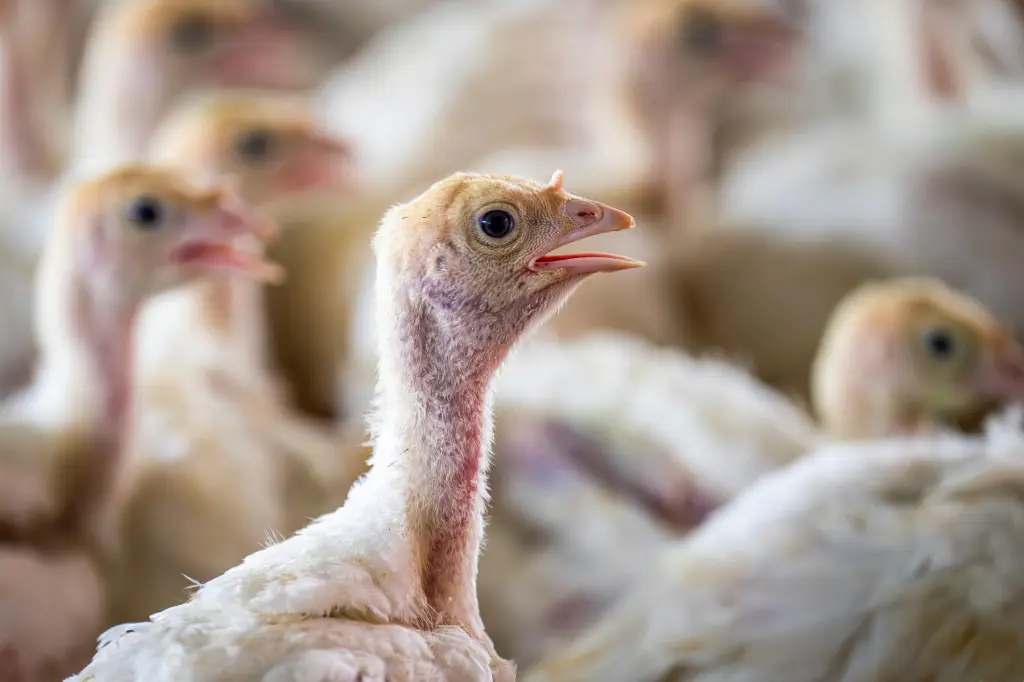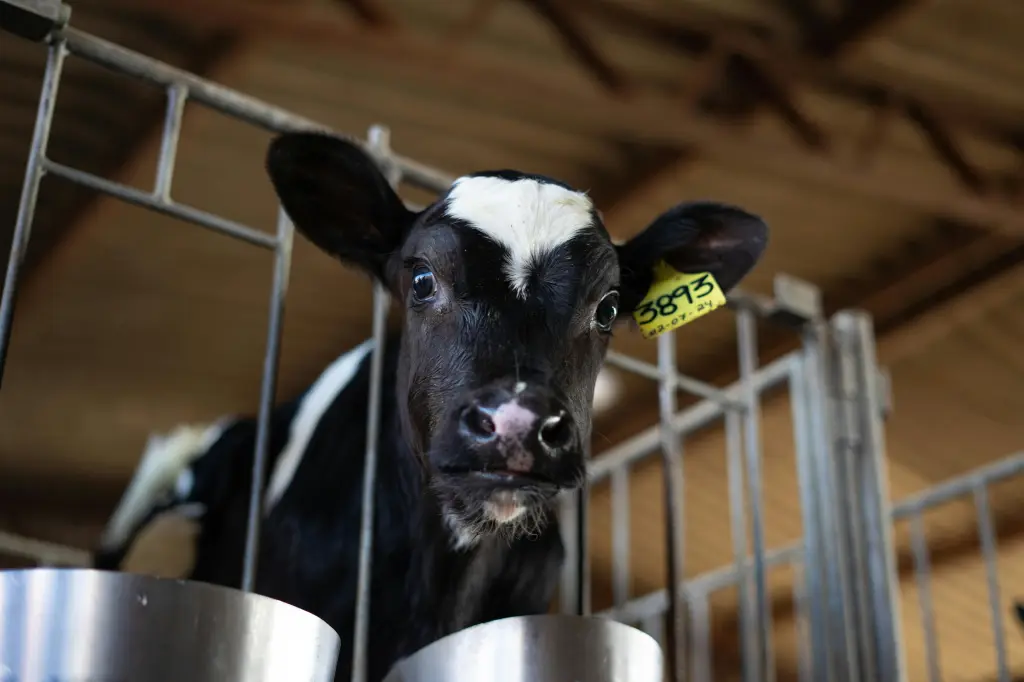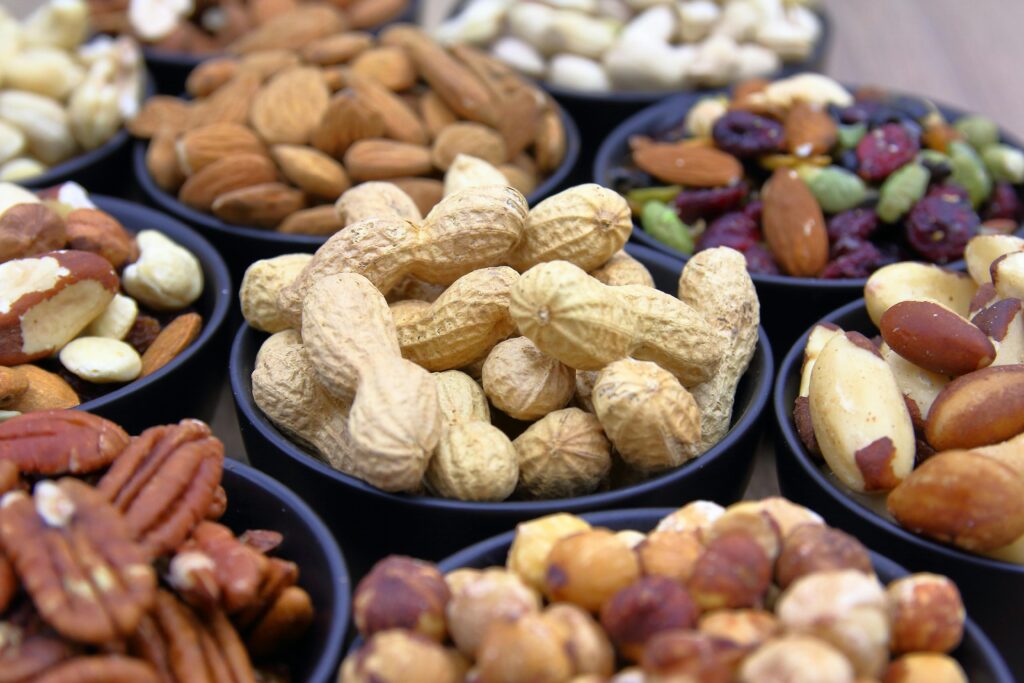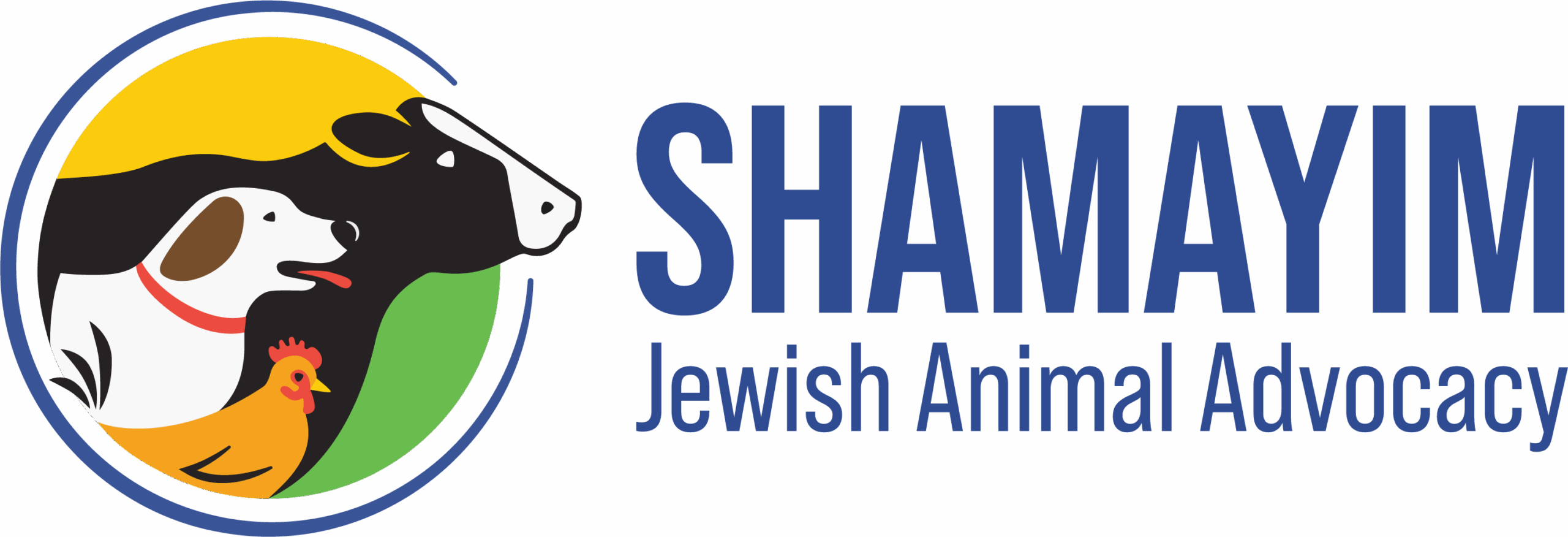Vegetarians, vegans, or those who have attempted to reduce their consumption of meat and dairy products have likely encountered individuals who try to argue against their choices in an effort to persuade them to return to eating animals. While it may be tempting to defend one’s perspective by presenting the arguments that inspired the dietary change, directly addressing and countering the arguments being made can often be more effective. This article outlines the 10 most commonly cited reasons not to go vegan—and explains why every one of them is flawed.
1 – We have a God-given right to eat meat and dairy

Many people will simply point you in the direction of their local kosher butcher to show you that Judaism condones the consumption of meat and dairy. The fact that “Hashem has told us that we can eat animals with split hooves that chew the cud (cows, sheep, etc.), and fish with fins and scales (salmon, tuna, etc.)” might be given as a reason to eat meat, and on the surface this can seem like a check-mate argument.
However, as soon as we begin to examine the realities of factory farming, which accounts for nearly all meat and dairy production in the US and the overwhelming majority of production worldwide, we begin to see that producing meat and dairy products goes against religious teachings.
Before we do, it is worth reminding ourselves about three God-given duties, which should take priority over God-given rights.
- Tikkun Olam is the Jewish duty to repair and improve the world to make it just and fair to all.
- Tzaar Baali Chayim is the requirement for all Jews to prevent suffering towards animals.
- Bal Tashchit is the commandment that prohibits waste and the destruction of nature.
The 613 commandments were given to Moses on Mount Sinai, so to help us understand which type of religious teaching should be more important, we can do a simple thought experiment.
Imagine that Hashem has given you only two commandments. First, you can eat food as long as it is yellow. Second, you cannot eat any fruit that comes from a tree. In front of you, there is a banana and a potato. We know that both foods are yellow, but bananas come from trees, whereas potatoes come from the ground. Which food do you eat?
The clear answer is that you eat the potato, as while you are allowed to eat yellow food, you cannot eat the banana, as it is a fruit that comes from a tree. Similarly, while Jews are permitted to eat beef and chicken, we cannot eat food from factory farms, as they cause pain to animals, destroy the planet, and waste natural resources (we will cover this in more detail later). As such, the fact that “ we have a God-given right to eat meat and dairy” quickly becomes an irrelevant argument.
2 – Humans are the superior species, both intellectually and spiritually
Many Jews believe that the Torah teaches us that humans are superior to animals. One reason could be that humans have a more godly soul than animals. Another could be that Hashem made humans after he had made the other animals, or perhaps it’s because humans were given dominion over animals after Hashem expelled Adam and Eve from the Garden of Eden. Known as ‘speciesism,’ this can be a tempting yet misguided justification for eating meat and dairy.
Let’s begin with a thought experiment:
Imagine that you witnessed someone attacking a young child. You go up to this person to stop them, and you ask them why they are attacking the young child. They explain that they are intellectually superior to the child, so they should be able to attack the child. How would you respond to the attacker?
It is clear that no one would accept this as a reasonable or rational excuse for harming a child. In reality, the fact that the adult is more intelligent than the child presents an even greater ethical issue, as it is widely understood that those who are less physically or intellectually capable should be cared for the most. This is why abuse directed at children, the elderly, and individuals with disabilities is considered particularly problematic.
Another thought experiment for us to consider:
Imagine that you witnessed someone attacking a young child. You go up to this person to stop them, and you ask them why they are attacking the young child. They explain to you that they are a rabbi, whereas the child has no faith in Hashem, and so they should be able to attack the child. How would you respond to the attacker?
Once again, we would not accept this as a legitimate excuse to cause suffering to another being. Just because someone may be less spiritual does not give us an excuse to harm them. You might even argue that someone who is closer to Hashem should minimize the pain that they cause others to live a more godly life.
The same logic that makes us reject the justifications in these thought experiments should be extended to animals. Just because humans may be more intelligent and more spiritual than animals, this does not give us the justification to abuse and kill them.
3 – Other animals eat meat, so why shouldn’t we?

On the opposite end of the spectrum, some argue that because other animals, such as lions and tigers, eat meat, humans should also eat meat, as it is deemed “natural.” Interestingly, the same individuals who claim that humans are superior to animals often use this argument to justify consuming meat. Rather than dwelling on the contradiction of justifying behavior by mimicking other animals while simultaneously claiming superiority over them, it is worth examining why this argument is fundamentally weak, even on its own.
We know that humans should not act like animals from the laws of Kashrut, which require all blood to be removed from the animals before being eaten. This law is explained to help remove all of the animal’s life essence from the meat, which is thought to be stored in the blood, as a way to prevent humans from becoming too animal-like. Moreover, there are many behaviors that animals engage in that humans wouldn’t do, both because the Torah forbids it and also because it goes against our basic moral compass.
Many animals engage in infanticide (killing babies), murder, rape, theft, and other types of behaviors that humans don’t engage in. If someone justified theft because other animals steal, you would think that unacceptable.
Even if we did think it was okay to engage in behaviors that other animals engage in, such as eating meat, we would have to accept the fact that the way that we produce meat and dairy is highly unnatural. In the wild, all prey animals live a free and normal life in nature, able to express their natural behaviors. In farms, animals are kept in cages, routinely abused by workers, selectively bred to produce as much food as possible, and cannot be thought of as living a ‘natural’ life.
As the overwhelming majority of us will acquire meat and dairy from factory farms, we cannot say that we are simply following the behavior of other animals. And even if we were, we should ask ourselves whether we should.
4 – Animals can’t really feel pain
For centuries, many people believed that animals can’t feel pain. Most likely due to a lack of scientific evidence or perhaps a lack of interest in the subject, people would force animals to be their slaves and carry out hard work as they didn’t consider the fact that animals could feel pain and suffer. Nowadays, around 100 billion animals suffer yearly in farms for food, medical testing facilities, and the wildlife entertainment industry.
Even if you’re unsure as to whether or not an animal can feel pain, we can do a simple thought experiment to help us understand if we should engage in behaviors that are likely to cause pain to an animal:
One member of your family has tragically fallen into a coma. The doctor says that they are unlikely to feel any pain, but there is still a chance that they have physical sensations. A surgeon needs to remove a limb from their body and wants to do it without any anesthetic because they believe that your family member can’t feel any pain. Would you demand that the surgeon use an anesthetic?
Most people reading this will demand that the surgeon use an anesthetic despite the slim chance that the family member can feel pain. This is because we should follow the ‘precautionary principle’—the idea that we should use caution when there is a potential for harm, but scientific knowledge is limited. While this thought experiment is helpful if we’re in a situation where we don’t know if animals can feel pain, we know that animals can feel pain, as there are multiple instances in Jewish scripture that teach us not to cause pain to animals.
Kosher slaughter was required as a way to minimize pain to animals, and Tzaar Baali Chayim requires us to prevent suffering towards animals. How can pain and suffering be minimized if the animal can’t experience it in the first place? Not only do animals suffer physically, but they also suffer emotionally. The Torah recognizes this and prohibits both cooking a kid in its mother’s milk and taking eggs or chicks from a nest while the mother bird is there, showing concern for the emotional pain of the mother bird or cow, who shouldn’t witness the killing of her children.
With advancements in science, there is no way to deny that animals are sentient beings who can feel pain and suffer. We also have irrefutable evidence that animals suffer greatly in factory farms, medical testing facilities, and the wildlife entertainment industry.
Just to recap, we know the following three truths:
- Animals are sentient beings that can feel pain and suffer.
- Animals suffer a lot when farmed for food, used in medicine, or for entertainment.
- Jews have a halachic duty to minimize pain and suffering to animals.
If we accept all of the above to be true, then it becomes clear that we cannot take part in the industries that cause pain to animals, including eating meat and dairy, wearing an animal’s skin as clothing, or taking part in any industry that exploits and abuses them.
5 – Factory farming isn’t that bad

Some people who eat meat and dairy are comfortable knowing that animals are kept in factory farms, but they justify their meat eating by explaining that factory farming isn’t that bad. When you look at the packaging of your favorite meat and dairy products, you tend to see animals out in the wild, often with the word ‘happy’ on the package. The reality could not be further from what is shown to you in store.
Nearly 100% of all meat and dairy products in the US come from factory farms. Factory farming is a highly intensive farming method aimed at maximizing profit while minimizing resource use. In these operations, numerous animals are kept in cramped conditions, frequently housed indoors for their entire lives.
Cows, chickens, pigs, and fish are the most commonly kept animals in factory farms, and they all suffer abuse in the pursuit of cheap meat. Mothers are often separated from their babies, body parts are mutilated without an anesthetic, animals are kept in cages so small that they can’t move, and animals have been selectively bred over decades to produce as much product as possible at the expense of their health and wellbeing. It is clear how factory farming contrasts with the teachings of Tzaar Baali Chayim.
There is no denying that factory farming is terrible, and there is also no denying that every time you eat meat or dairy, it has likely come from a factory farm. Yes, a tiny minority of people may have access to meat and dairy products from a high-welfare local farm, but the rest of us will not. Therefore, we must confront the reality of the majority rather than the minority.
Those who have not seen videos from inside factory farms are urged to watch them. While they are difficult to watch, it is crucial not to turn a blind eye to suffering. We only need to look back to 1930s Europe to remember what happens when people choose to ignore prejudice, abuse, and suffering.
The negatives of factory farming extend beyond just the animals inside the farms. Workers are often vulnerable people, exposed to dangerous jobs, who end up suffering from physical or psychological harm after working on the farm. Even children were found working in kosher farms, and in other cases, workers were paid in drugs rather than in money.
Factory farming also conflicts with the duty of Tikkun Olam and Bal Taschit, as it is a leading cause of deforestation, pollution, land use, freshwater use, biodiversity loss, and global warming. Farmed animals eat plants, and they eat a lot of them. Around 80% of the world’s soy goes to animal feed, and over one-third of all crops grown worldwide are fed to animals. As animals are inefficient at converting the energy from crops into calories in their meat, we end up wasting around 75% of the calories we feed to animals.
This includes all of the land, water, fertilizer, pesticides, herbicides, energy, labor, and money that goes into growing those crops. Farming animals is one of the most inefficient ways of producing calories and protein and can be directly linked to the majority of environmental destruction we witness today.
6 – Vegan diets are bad for wildlife
You might hear someone argue that vegan diets are bad for wildlife because of all of the insects, birds, small rodents, and mammals that can end up as victims of agriculture. Many animals indeed die due to farming crops, and it is correct that people should be concerned about animal welfare, but this argument quickly falls on its face once we go through some basic facts:
- Animals are likely to be killed in the production of crops.
- The overwhelming majority of crops grown worldwide are fed to animals.
- Animals require many more crops than humans do. If we stopped eating animals, we would need to grow less crops.
- Around 80 billion animals will be killed in factory farms each year.
- 20% of the world’s land is used for livestock farming. If we stopped eating animals, we could give that back to restore nature and wildlife.
If someone is genuinely concerned about saving the largest number of animals, then the most effective way is to stop eating meat and dairy products. In fact, rather than trying to get people to stop being vegan because animals die in the production of crops, it would be a better use of time and energy to try to get people to stop eating animals, thereby saving the most animals.
7 – Farmed animals wouldn’t exist if we didn’t eat them

People who are desperate to justify eating meat and dairy products may argue that farmed animals wouldn’t exist if we didn’t eat them. The animals that we farm today would not be found in the wild, as they have been selectively bred over thousands of years: Chickens evolved from the Southeast Asian red jungle fowl around 4,000 years ago; Cows evolved from aurochs, a wild bovine species, around 10,000 years ago; Sheep evolved from the wild Asian mouflon, around 12,000 years ago, and; Pigs evolved from wild boar, around 10,000 years ago.
As such, it is true that what we consider to be farmed animals today would not exist if humans didn’t eat them. Still, we need to ask ourselves an important question – is preserving around 5-10 farmed animal species worth destroying the remaining 5-10 million species worldwide?
Livestock accounts for 62% of all mammal biomass worldwide, with cattle alone accounting for 35%. Humans comprise 34%, and wild animals account for the remaining 4%. Poultry accounts for 71% of all bird biomass.
There are around 100 billion animals farmed each year. Even if everyone on Earth reduced their meat and dairy consumption by 99%, around 1 billion livestock animals would still be farmed, hardly a cause of concern for extinction. We could go even further and work towards a world where no one eats animals, respects them, and allows them to live in nature. In this scenario, farmed animals would still live, just not on a farm. Millions of other species exist in the world without needing to be farmed by humans; why can’t the same happen for cows, sheep, and chickens?
8 – Eating meat or dairy is fine as long as I reduce how much I eat
Meat-free Mondays and Veganuary have become popular with people looking to reduce their meat and dairy consumption but aren’t quite ready to go vegan. Reducing your meat and dairy consumption is undoubtedly better than not. It is not, however, ‘fine’ to eat meat and dairy products because you’ve just reduced your consumption.
Let’s use another thought experiment to highlight this:
You have witnessed your neighbor abusing their dog multiple times a day, every day. You explain to the neighbor that they should not abuse their dog, as the dog can suffer, and the neighbor seems to understand this and accept it. A week later, you witness your neighbor abusing the dog again, and when you question them, they explain that it’s okay because they’ve reduced how often they abuse the dog. How do you feel about their response?
You probably would not accept their response as a valid justification for abusing the dog. In fact, you might think that it is even more abhorrent that the neighbor understands the impact of their actions and continues to engage in them, albeit with a reduced frequency.
It is understood that going fully vegan can be challenging, as not everyone has the access, ability, or motivation to make the transition. Veganism should not be seen as an all-or-nothing approach, and there is great respect for those who have taken steps toward adopting a vegan lifestyle.
However, the justification that eating meat and dairy is acceptable simply because consumption has been reduced cannot be accepted. It is essential to recognize that, regardless of the amount consumed, eating meat and dairy contributes to a system of exploitation, suffering, and destruction.
We can use this knowledge to further motivate us to eliminate meat and dairy products from our diets, but if we are unable to do this, we should at least respect the animals we’re consuming enough to acknowledge that they have suffered a life of misery and pain.
9 – Where do you get protein from in a vegan diet?

Many nutrition-concerned people will question a vegan’s ability to get enough protein in their diet and resort to using meat and dairy products to acquire their daily protein requirement. Apart from the fact that there are countless perfectly healthy vegans and vegan bodybuilders, this argument falters on some other key fronts.
We can start by acknowledging that many people, especially in the US, over consume protein, and consuming too much protein can be harmful. Once we know this, getting ‘enough’ protein becomes much more manageable.
The next thing we need to consider is that there are plenty of plant-based protein sources, including whole foods such as legumes and pulses and processed ‘fake’ meats. Moreover, these plant-based protein sources outperform meat in various health and sustainability metrics, strengthening the case to swap our animal products for plant-based products.
Finally, we should understand how animals get their protein in the first place. Farmed animals are fed large amounts of plant-based protein, resulting in protein in their meat, but this is a highly inefficient process. Eggs are the most efficient in protein conversion, but 75% of the protein fed to egg-laying hens is still wasted in the production of eggs. For cows, over 95% of protein is wasted.
Yes, meat is more protein-dense than plant-based foods, but many plant-based foods are comparable to meat and do not require the abuse of animals, the destruction of rainforests, or the exploitation of people. We should seriously consider what is more important—the pursuit of protein-dense foods or the pursuit of Tikkun Olam, Tzaar Baali Chayim, and Bal Taschit.
10 – It is a normal part of my culture to eat meat and dairy
Finally, we come to the argument that “it is a normal part of my culture to eat meat and dairy.” Chicken noodle soup has become a staple of Shabbat dinner, and a salmon and cream cheese bagel is often found at a kiddush or bar mitzvah, but does this act as a justification to continue doing something?
The key that enabled Judaism to survive almost 6,000 years is our ability to retain the essence of Judaism while adapting to the changing times and cultures. When we first arrived in Israel, there would have been no smoked salmon for the Israelites to have eaten. Does that mean that over time, we shouldn’t have eaten salmon just because it wasn’t a part of the existing culture? Just as Jews have incorporated more meat and dairy into their diet over the centuries, we must now follow suit and adapt our diets, but this time removing meat and dairy.
No section in the Torah specifies that we must eat meat or dairy products; rather, we are told to eat food that reminds us of sweetness, hardship, and similar emotions or memories. This can easily be achieved with plant-based products, such as date syrup instead of honey or oat milk instead of dairy milk.
While practically, the culture argument doesn’t hold up to scrutiny, it also morally fails quite quickly. One final thought experiment for you to ponder:
The year is 1942, and you live in Poland. You witness a group of people attacking a Jewish person. You tell them they should stop, but they explain that it is a normal part of their culture, so they shouldn’t need to stop. How do you respond to their argument?
We can see that just because something has been done, it doesn’t mean it should have been done in the first place or should continue to be done in the future. From today, you can create the culture that you want to be a part of. I hope we all want to be part of a kind, compassionate, and loving culture, and you can work towards this culture by stopping eating meat and dairy.
Concluding thoughts
This article has addressed the 10 most common arguments against veganism and demonstrated why they are flawed. While much of the discussion has relied on thought experiments, these can be valuable for highlighting inconsistencies in reasoning by applying logic to alternative scenarios. It is hoped that readers will reflect on the reasons they use to justify consuming meat or dairy and consider moving toward a more compassionate diet—one that aligns with Torah values while benefiting animals, the planet, and humanity.





Leave a Reply